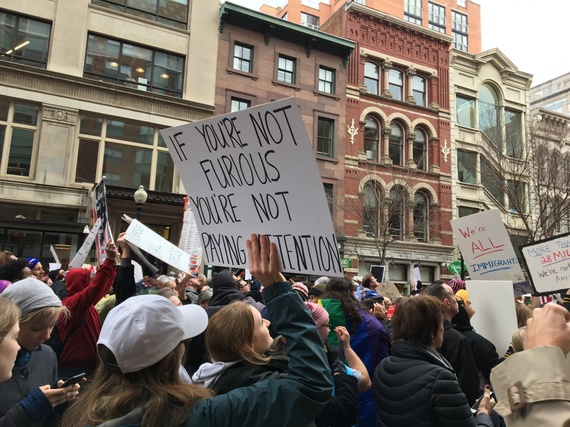The ingenious framers of the American constitution more than two centuries ago got most things right. It's amazing that a document crafted in the 18th century can be largely intact now in a very different world than the one in which it was conceived. Their unique plan to structure a government system that would check the power of the executive -- wisely called "checks and balances" -- has allowed us to succeed and make progress even when our President is misguided or has made a mistake.
We saw a great illustration this past weekend after the President decided to ban travelers from seven Muslim nations from entering our country. In dictatorships or monarchies no one would been able to overrule this pernicious attempt at excluding people for their religion. In America, within a few hours of this Executive Action, a Federal Court Judge in Brooklyn was able to "stay" this action and temporarily right a potential wrong. I live across the street from the Federal Courthouse in Brooklyn and it was amazing to watch the lights flick on Saturday night for an ACLU injunction that led to a hearing and a stunning rebuke to Trump.
Wow. That's a real democracy in action and it heartened millions of Americans who worry that we are going off a cliff with this new administration. I'm sure this "stay" is just the beginning of a long battle, but Round One ended encouragingly and it reminded everyone that in America citizens have lots of power and legal mechanisms to fight the White House. No other country in the world has such a robust and resilient form of government.
In addition to the "checks and balances" in our three branches of government -- executive (President), legislative (Congress) and judicial (the courts) -- we have a First Amendment that is also one of the more stunning pieces of forward thinking in governance. It alone is another bulwark against an out of control executive branch.
The First Amendment has never felt more important in my lifetime than it has these past few weeks. And I'm a child of the 1960s.
The peaceable protests that went on around the country the day after the inauguration -- engineered and mostly populated by women -- were beautiful evidence of the strength of our democracy and our unparalleled tradition of free speech. It showed our fellow citizens, the rest of the world and hopefully the incoming administration that the power to peaceably assemble and protest is one of the most powerful rights Americans retain as citizens of this republic.
More than two million protesters around the country -- a sum that dwarfed the attendance for the swearing in near the Capitol -- sent a message to the incoming administration that there is a movement brewing that will resist this administration's attempts to trample on minority, women, immigrants, LGBT and other oppressed groups rights.
Like its predecessors in the anti-war movement in the 1960s and more recently Occupy Wall Street and Black Lives Matter, the Women's March will undoubtedly be a thorn in this government's regressive side and one hopes that it will also translate into efficient political organizing and encourage more women to run for national office in 2018 and beyond.
This past weekend, a pop-up demonstration at Kennedy Airport and many other airports around the country, illustrated the passion and solidarity of those who were appalled by the anti-immigration actions of the new president. "If you build a wall, we will tear it down," they chanted over and over again. A quick mobilization at airports around the country, within hours, is an astounding modern development that is possible through the powers of social media (largely Facebook). Like the "Arab Spring" of a few years ago that toppled dictators in Egypt and Yemen, the power of viral protests should never be underestimated.
And now a word about another vital piece of the First Amendment: the right of free speech that gives power to the media. The press has often been endearingly called "The Fourth Estate" of government because it, too, belongs in our system of checks and balances. As a graduate student at the Columbia School of Journalism in the mid-1980s I remember the first thing we were taught there: good journalism comforts the afflicted and afflicts the comfortable. Truer words could not be spoken about the role of the media in America in this scary moment. We need a strong, independent and fair press to question, probe and expose any instances of misuse of power or corruption or bullying of the oppressed.
We need the media to have the full support of the citizenry against any bullying or manipulating by the government so we don't degenerate like other countries have in history when the government made the media the enemy. Steve Bannon's chilling words last week that the "media is the opposition party" and "should shut up" are not too far removed from the bullying tactics in Nazi Germany in the mid-20th century. And we know where that went.
So, as New Yorkers and citizens of the most democratic country in history, we must exercise our power to assemble, protest, organize and support our free press.
The resistance has just begun.
Tom Allon, the president of City & State, was the Liberal Party-backed candidate for Mayor in 2012. Comments: tallon@cityandstateny.com

